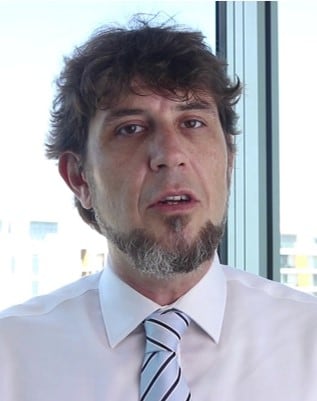Find the key to business success
Mini MBA

Mini MBA programme
Mini MBA is a unique programme focused on developing essential business skills and know-how. Our world-class, inspirational tutors will guide you through this prestigious programme, introducing you to valuable knowledge and skills in business, leadership, project management, and finance. They will also present proven business and marketing strategies. This training will help you grasp the bigger picture of the business world and understand the various perspectives that need to be taken into account when making business decisions.
Mini MBA
Awarded prestigious programme
In 2019, our PwC Mini MBA programme won the prestigious Education Leaders Awards in the Best Learning Experience category and is being offered in 12 countries.

Modules of Mini MBA
- Module 1: Corporate and Business Strategy
- Module 2: Marketing in the Digital Age
- Module 3: Accounting Basics & Financial Management
- Module 4: Operational Agility: Strategies for Efficiency
- Module 5: Enabled Organisation
- Module 6: Leadership in the 21st Century
- Module 7: Project Management in Everyday Business
- Module 8: Innovation & Creative Thinking
- Module 9: Linking it all together
Module 1: Corporate and Business Strategy
The introductory module of PwC’s Mini MBA sets the tone for the program by introducing a comprehensive mapping technique designed to illuminate the primary areas where organizations can cultivate growth.
The module commences with an overview of the contemporary business environment. It emphasizes the dynamic nature of organizations in the 21st century, which undergo constant transformation driven by technological advancements and disruptive innovation, but also by factors as consumer behaviour shift, globalization and demographic changes. Following this introduction, the module delves into an indepth exploration of three levels of strategy – Corporate, Business, and Functional – and delineates the objectives pertinent to each level. This is accomplished through the examination of practical examples from well-known organizations, coupled with the application of relevant theoretical frameworks.
Participants are guided through PwC’s Mini MBA map, acquainting themselves with the concepts of external and internal analysis as integral components of strategic planning. Moreover, participants will be expected to map their existing business experience onto these theoretical models and engage in discussions regarding the practical application of these models in real-life business environments. This hands-on approach ensures that theoretical concepts are effectively translated into actionable strategies.
Module 2: Marketing in the Digital Age
This module is focused on areas such as: market positioning, combining offline and online marketing tactics; social media for businesses, the importance of content & video and finding the right balance; Customer Relationship Management through software systems & automation.
Marketing involves identifying the customer’s needs and wants and satisfying them through the appropriate “marketing mix”. Together with an analysis of the external environment (from a marketing viewpoint), customers and competitors, these will be the focus of this module. In addition, it should be noted that areas such as branding, Internet marketing, marketing through social media and other concepts and ideas will be explored.
There is a dominant move in the market towards visualisation (videos) and content marketing and these will be explored along with other important trends. Participants should be able to use various marketing tools and theories in real life examples as well as a good look in the area of ethics in marketing.
Module 3: Accounting Basics & Financial Management
This module attempts to provide the basic principles of Accounting & Finance as it includes the areas that people involved in business should be aware of, mainly at an understanding level (not necessarily synthesis).
During the module, you will focus on:
- Budgets,
- Analysis of financial statements,
- Capital, profit, revenues,
- Margin, dividends,
- Cash flows and other items.
Module 4: Operational Agility: Strategies for Efficiency
This module follows a natural progression from the Corporate and Business Strategy module and is designed to equip Mini-MBA participants with the requisite knowledge, skills, and tools essential for steering and overseeing high-performing, adaptable operations across diverse business landscapes.
Expanding upon the strategic foundation laid in the preceding module, this segment delves into the intricacies of day-to-day operational management and process optimization within a business context. It delineates the distinction between strategic planning, product design, resource management, and quality enhancement, emphasizing the pivotal role of operations management in executing strategic objectives and ensuring organizational effectiveness.
At its core, this module is dedicated to imparting practical insights and actionable strategies for crafting and implementing operations plans that seamlessly align with the overarching business and sales goals of a company. Participants will gain a comprehensive understanding of how to translate strategic vision into operational reality, with a keen focus on orchestrating daily processes and overseeing business operations with precision and efficiency.
Throughout the module, participants will engage in discussions and activities aimed at honing their ability to develop and execute operations plans that drive business success. By emphasizing the integration of operational tactics with strategic objectives, this module empowers participants to navigate the complexities of modern business environments with agility and proficiency, fostering a culture of continuous improvement and operational excellence.
Module 5: Enabled Organisation
This module explores the link between organisational structure and management effectiveness. It addresses key topics like complexity and change, and looks at the management skills needed to respond intelligently. It is based on the idea that more traditional management styles (that place an emphasis on command and control) are becoming less suited to an business environment where talent is mobile, innovation is essential and connection is everywhere.
The module will challenge participants to explore the impact of change on themselves and on the people they manage. It will also look at the importance of differentiating between ‘performance’ and ‘contribution’ when giving feedback and creating a more engaged workforce.
The module will also identify and rehearse a set of skills (including coaching skills) that are aimed at helping staff cope with, and respond positively to, the changes they are facing.
Module 6: Leadership in the 21st Century
High-quality leadership is the hallmark of successful organisations. Some people have a natural talent for the role but good leadership can be learned through training, coaching and practice. The quality of the leadership in place through the ranks of an organisation will in large part determine the success of that organisation in the long term. It is therefore essential that anyone entrusted with a position and responsibility for leading people fully understands and appreciates what this leadership role requires of them in practice.
In this module, the emphasis is placed upon the leader as a person and on efforts to understand individuals and to create an environment where differences, new ideas, curiosity and innovation are encouraged and cultivated. Various dimensions of leadership will be analysed, with reflection on the rapidly changing business environment and people’s needs.
Module 7: Project Management in Everyday Business
This module has been designed to provide understanding of the importance of project management methodology and approach in everyday business. The goal of the module is to help participants develop a unified approach towards project management challenges. It is also designed to help reduce the stress associated with project management, and to increase the chances that the project will be completed on time, within budget and to the required quality.
In addition, through practical exercises, participants will learn about the most important project management tools and techniques and to compare theoretical models with their previous experience.
During the module, you will focus on how to:
Initiate, plan, execute, monitor and control, and close a project,
Understand and manage stakeholder requirements and expectations,
Manage a project in line with organisational strategy,
Understand the processes necessary for the successful completion of a project.
Module 8: Innovation & Creative Thinking
The “Innovation and Creative Thinking” module is specifically crafted to empower participants with the critical skills required to spearhead and sustain innovation within their organisations. In today’s rapidly evolving business landscape, the ability to think creatively and introduce groundbreaking ideas is paramount. This module provides the tools and insights necessary to transform innovative concepts into practical solutions that can significantly impact business success.
Participants will engage in a thorough exploration of the innovation process, from the genesis of an idea to its execution. The curriculum is designed to challenge conventional thinking patterns and encourage a departure from traditional solutions. By fostering a deep understanding of the theoretical underpinnings of innovation, coupled with practical techniques for creative problem-solving, this module ensures that participants can adapt and thrive in diverse business environments.
Through this module, learners will delve into various dimensions of creativity and innovation, including the psychological aspects of creativity (growth mindset), the structural frameworks that support innovative thinking, and the skills necessary to drive innovation forward. This comprehensive approach ensures a balanced delivery of content that is both insightful and applicable.
Interactive sessions, along with collaborative projects, practical exercises, insightful discussions and case studies of successful innovations, will provide participants with a real-world perspective on overcoming challenges through creativity. This immersive learning experience not only enhances individual capabilities but also prepares participants to lead their organizations towards a more innovative and competitive future.
Module 9: Linking it all together
The wrap-up is based on the PwC’s Mini MBA’s awarded mapping technique and the sequence of modules. It puts the ‘pieces to the puzzle’ together and creates a framework towards understanding - through visualization - what has been delivered throughout the course. It also supports the case assessment day as a discussion will take place during this last day preparing candidates for the case assessment.
At the end of this module, you will take part in the Harvard Case Study Assessment Paper. By completing this case study, you will receive the PwC Mini MBA certificate.
Course details
Mini MBA comprises 9 related sessions that will provide you with comprehensive and practical-oriented business knowledge and skills that you can apply in your own company.
By joining our online programme, you will be able to learn from the comfort of your home or office. All sessions are live and interactive, and you will have full access to our expert trainers and other participants. The programme is international so you will have a unique opportunity to share your experience with other participants from various business industries across Europe.
What is the difference between a Mini MBA and a regular one?
The programme is led by internationally recognised lecturers and experts from the business world who have extensive practical experience in managing their own projects and businesses.
It can be completed faster than a traditional MBA programme offered by business schools.
Additionally, it features a unique “chartered flow” approach to understanding how organizations operate, which professionals can apply almost immediately in their workplace.
Another distinguishing factor of the Mini MBA from the classic MBA programme is the “Linking it all together” module. This module helps you consolidate the individual parts of the programme, providing you with a comprehensive understanding of the functioning of the business world.
More than 1000 CEOs, managers, and entrepreneurs have already successfully completed the PwC Mini MBA programme. Our experience thus far has been highly positive, even among CEOs who have stated that the programme helped them update their knowledge and establish connections with various operational levels of management. Additionally, managers with technical backgrounds have noted that the programme aided them in comprehending broader aspects of business and encouraged more strategic thinking.
Mini MBA is intended for:
Managers at all levels in various lines of service,
Owners of small and medium-sized enterprises,
Individuals intending to start their own businesses or startups,
Key talents in the succession pipeline aspiring to senior leadership roles,
Anyone seeking to enhance their strategic thinking and gain a comprehensive understanding of organisational functioning.
Participants are expected to possess relevant knowledge of the company's operations and an understanding of its strategy, human capital, marketing, and other operational challenges.
Mini MBA ends with the Harvard Case Study Assessment Paper. After successfully completing the business case, you will receive a PwC Mini MBA Certificate.
Tutors
Dates and details
| Date | Course | CPD points | Language | Place | Price (excl. VAT) | Registration |
| In preparation – Spring 2026 | 91 | ENG | Online | 68,200 CZK* |
Express interest |
* Modules can be attended separately. Price per module 3, 4 and 6 is 8,550 CZK excl. VAT. Price per modules 1 & 2 is 11,000 CZK excl. VAT.
| Structure of the programme | Timing of sessions | Date |
| Module 1: Corporate and Business Strategy | 11 a.m. – 5 p.m. | To be confirmed |
| Module 2: Marketing in the Digital Age | 1 p.m. – 5 p.m. | |
| Module 3: Accounting Basics & Financial Management | 1 p.m. – 5 p.m. | |
| Module 4: Operational Agility: Strategies for Efficiency | 11 a.m. – 5 p.m. | |
| Module 5: Enabled Organisation | 1 p.m. – 5 p.m. | |
| Module 6: Leadership in 21st Century | 1 p.m. – 5 p.m. | |
| Module 7: Project Management in Everyday Business | 1 p.m. – 5 p.m. | |
| Module 8: Innovation & Creative Thinking | 10 a.m. – 5 p.m. | |
| Module 9: Linking it all together | 10 a.m. – 5 p.m. |











